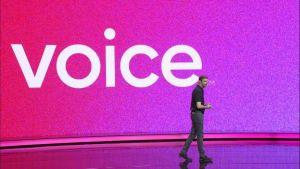Beta Voice of EOS Developer Block.one Is Not for Everyone Yet
Tomorrow, Block.one, the company behind the EOS blockchain platform, will be launching the beta version of their decentralized social media platform, Voice. It comes with limitations though.

As promised back in December, Voice Beta – a rewards-based platform for creating, distributing, and discovering content, that comes with a utility token called ‘Voice Token’ – will be launched on Valentine’s Day, February 14.
However, it will first be released for the residents of the United States only and with a limited feature set, the platform explained. It will start inviting groups of users who have requested beta access – first those that took the Pre-Beta survey in the United States, then to other U.S. residents at random. Their goal here is to “take on feedback in a defined, manageable, and efficient way,” says Voice in an emailed announcement. “It’s about real-time technical testing and iteration within one defined location,” their blog post explains further.
All content on Voice Beta will be visible to logged in, registered users only, who’ll have to confirm through HooYu identity verification service utilized by Voice that they’re real persons and U.S. residents.
Following this initial feedback and subsequent optimization in the United States, Voice says that they’ll “continue a steady rollout to English speaking territories, then globally, collaborating with local regulators as we go.” They’ll update the public on the details as well as the situation develops but they expect many unspecified changes to the product along the way.
Another blog post may be providing additional clarity into why the U.S. is the only location for the launch currently. In it, the platform discussed the regulatory hurdles that are affecting the entire business, content and rollout included, and how that poses a challenge for a platform to be truly global. “This scope requires that we achieve legal compliance wherever we intend to make Voice available. We’ve already looked closely at all our key markets across the Americas, Europe, Africa and Asia.”
Product and legal team have taken steps to limit functionality of the decentralized platform where needed, they add, as well as to “futureproof” Voice so they can be rolled out quickly in new territories as they become available. In the meantime, the platform has been consulting with the U.S. Securities and Exchange Commission since last December, and have built policies and systems to comply with the Office of Foreign Assets Control (OFAC) and anti-money laundering requirements.
Meanwhile, as reported, Block.one announced Voice in June last year, and they paid USD 30 million in cash for the Voice.com domain. But a surprising development occurred in January this year as Block.one changed their mind about the blockchain that will host Voice. While initially the EOS Public Blockchain was said to be the one, the FAQ changed to say (and still says) that Voice Beta will be run on a purpose-made EOSIO blockchain, and in time, possibly the EOS Public Blockchain and potentially others that are suitable.
Meanwhile, in December, we’ve seen Twitter launching a new project, bluesky, aimed at developing a ‘decentralized standard for social media.’
EOS is currently (12:19 PM UTC) trading at USD 5.24. It dropped 1.8% in a day and appreciated almost 14% in a week.
___
Learn more: Ethereum Grows on Gaming Dapps, Tron – on Gambling, EOS – Going Downhill




